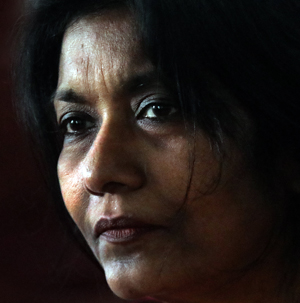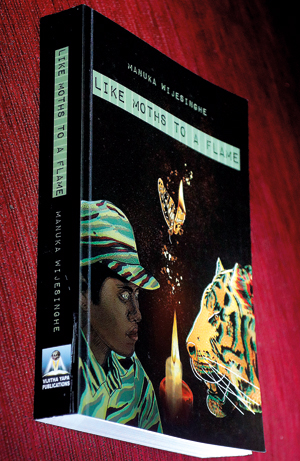Manuka’s love for Sufi poetry ignites ‘Like Moths to a Flame’

Manuka Wijesinghe and inset, her new novel. Pix by M.A. Pushpa Kumara
Manuka Wijesinghe is a maverick who has gathered much moss by rolling from one esoteric subject to another. After schooling at CMS Ladies’ College, she learnt German and Spanish; Arabic and Sanskrit; homeopathy and Chinese medicine; wrote poetry and plays; delved into the religions of the world; acted, danced and fell utterly in love with Sufism.
It is her love for Sufi poetry that glows at the heart of ‘Like Moths to a Flame’, her new novel launched yesterday at the Flower Road Vijitha Yapa Bookshop.
Her first book, Monsoons and Potholes, was a hilarious evocation of growing up in the ’60s to the ’80s amidst political calamities of a turbulent nation. Theravada Man was her reaction to rational Buddhism and ‘Sinhala Only’ took on that pivotal 1956 act regarding the national language, which “did not kill English but Sinhala”- estranging the language from its users with ornate ‘Sanskritisation’.
Her new book set against a not very defined period (though ending around the Duraiappah assassination), looks at what led young Tamils to take arms against the state.
It is at the door of the Sinhala state that Manuka leaves the blame.
The novel was born when, nostalgic for a period she knew as a youth when the races lived in amity as one, their diversity like a shared dish on Deepavali day – Manuka began looking for something that could unite all our peoples: in short a god who is loving and understanding- a god with no ‘cultural trappings’ unlike Murugan or Visnu.
 After a long ‘pilgrimage’ she came across Sufism.
After a long ‘pilgrimage’ she came across Sufism.
After years spent with Sufis, Manuka could ‘feel’ something inarticulate about their god.
At first as a Buddhist with no gods other than wish granting deviyos she had to read Greek philosophy to understand this god- “a detour, but essential”.
One of the main characters in the novel, ‘the Bawa’, is a Sufi who quotes the Urdu Sufi poetry about the ‘parvan’ (the moth). “Like the moth that flies to the flame, the good Sufi wishes to be singed and burnt by god’s love.”
In the book, Elam was mistaken to be that ‘flame’ by the Tamil boys. “The spirit of the time in which these boys were living didn’t give them the sense of transcendence (that a god gives); It gives them only a sense of identity- this fight was for chauvinism, for race”.
The novel deals with ‘the Bawa’, the Sufi grandfather with the gentle soul, his Tamil wife Parvatiamma, a woman embittered because she was cast away by Hindu society for being born under inauspicious planets, their beautiful daughter, her older Hindu husband and their son who is ultimately lured by the dream of Elam.
This was the first novel where Manuka could not resort to written archives. She was working outside her cultural milieu, and so met Jesuit fathers from the East and Sufis, young Tigers and bereft parents to “understand Tamils and the anger they had about what the Sinhala state did to them”.
Whether in Delft or Kayts she shared meals and sat with the people, trying to understand their ways of thinking. The book is a huge canvas of the people she met.
The novel cuts through a wide cross-section; not only Northern Tamils and Muslims but also the Eastern Tamils (with a Jesuit training rather than a Hindu background) the estate Tamils and a few of the Colombo elite like SWRD Bandaranaike and Ponnambalam Ramanathan.
She draws the fine distinctions between the matrilineal Eastern Tamils whose men, not owning property, had ‘nothing to lose’ so were ready to embrace the Elam cause while in the North it was different.
Apart from having danced with Chitrasena and Khema, Manuka was for a long time associated with Indu Dharmasena’s comedies for in theatre her tastes are different from those she upholds as a writer of fiction – rather light and bright.
As a writer, Manuka considers herself as not coming from the ‘Anglo Saxon’ tradition because save a few like Dickens she has not read much of the British cannon. With her Spanish, it was the Latin American writers and the masters of Magical Realism who formed her personal pantheon.
It was this probably that gave her the common touch in her writing for while the Spanish conquistadors were connected to the people, the British were more aloof from their colonized. With her deep thespian inclinations she finds it natural to come out with dialogues whereas prose writing is more laborious.
Poetry too comes spontaneously, and the prose in Like Moths to a Flame is poetic.
The book is based on Sangam poetry and to understand it Manuka had to read a lot. Each landscape is associated in sangam with a theme in love poetry (kurinji or mountains for elopement, mullai or forest for patient waiting over separation, marudam or plains and valleys for lovers’ quarrels, neithal or seashore for long separations and palai or desert for dangerous journeys by the hero).
Different scenes from the story are set in corresponding landscape so the novel has something of the formal beauty of the poetry.
Curiously Manuka finds it much easier to write when abroad. It is not just the spare time and the isolation, but she can concentrate better on what she is writing with distance between her pen and her island muse – to seeing its vast tapestry from a distance.
Searching for an ideal partner? Find your soul mate on Hitad.lk, Sri Lanka's favourite marriage proposals page. With Hitad.lk matrimonial advertisements you have access to thousands of ads from potential suitors who are looking for someone just like you.


